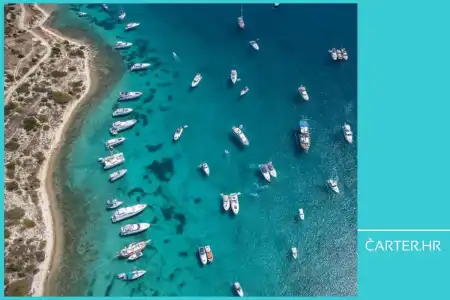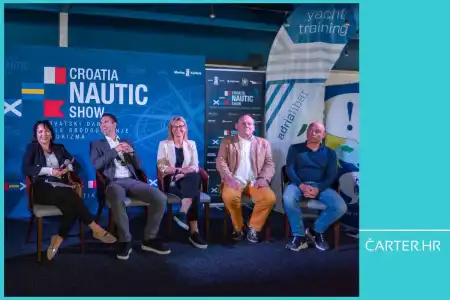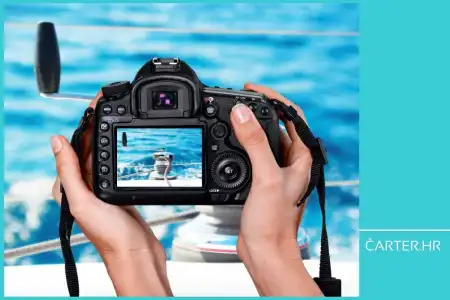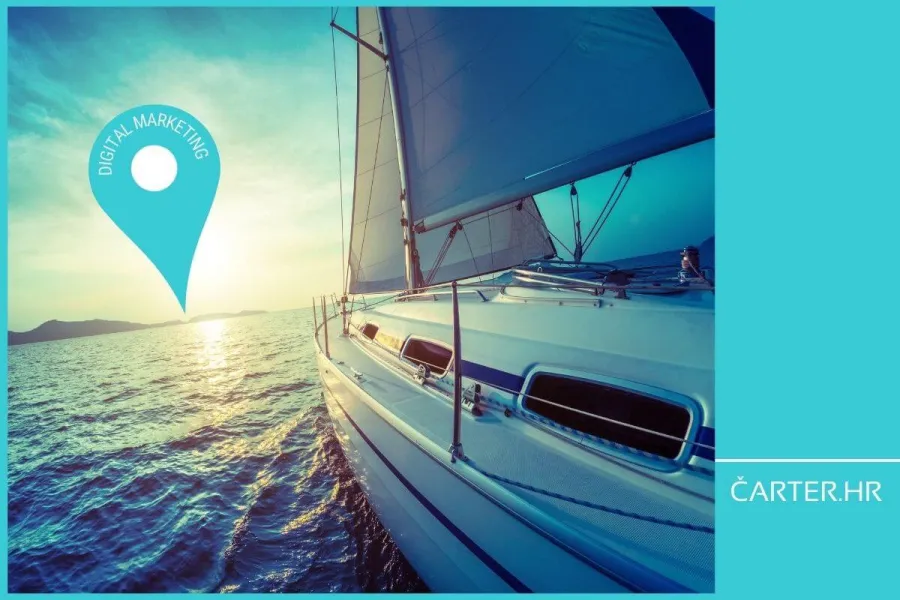
- 09.04.2025.
- News, Marketing, User experience
Digital marketing in the yacht charter industry is not a matter of trends but of responsible business. In this article, Selma Ćubara breaks down key misconceptions – from the illusion about online platforms to the misunderstanding of brand and guest loyalty. Clear, concrete, and encouraging, this text opens space for constructive conversation among agents, fleet operators, and everyone who believes that the relationship with the guest is not a cost – but the foundation of long-term success.
Why digital presence is not a luxury but a responsibility
In the yacht charter industry, where the competition is no longer just local but global, digital presence is not a matter of luxury or trend. It is a reflection of professionalism. Just as a clean deck and a reliable engine inspire trust in a guest stepping onto a boat for the first time, so too does a clear, informative, and user-friendly website reflect the seriousness of the company.
Today, when almost every guest is also a content publisher – through reviews, Instagram posts, and comments – the question of digital strategy becomes a question of relationship with one’s own market. A relationship that must be regularly monitored and responsibly built.
Five most common misconceptions holding back yacht charter company growth
If we become aware of the fact that we live and work in a time where guests are less and less likely to reach out by phone call, and more and more likely to explore the offer themselves using that very same phone, then it’s not hard to conclude that digital channels are becoming the main field where first impressions are made.
Yet despite this, certain entrenched beliefs still dominate the yacht charter industry, making growth harder and weakening relationships with guests. It’s time to take a closer look at them.
Misconception #1: It’s enough to be present on online platforms
There is a widespread illusion that being listed on major booking platforms will automatically bring reservations. But platforms are not your sales strategy – they are a shop window. And a shared window at that, where you are displayed only through your boats and among hundreds of similar ones, shown without context, without a story, and without a relationship with the user. If you are merely present but not ‘visible’, then you’re just a tenant in someone else’s space.
Digital presence means having your own channel where you set the rules of the game. Where guests choose you not only based on price, but on impression, trust, communication style, reputation, and the content you share. This doesn’t mean platforms should be ignored – but relying solely on them means giving up control over your own business.
Misconception #2: Digital marketing is for big players
This misconception affects small and medium yacht charter companies who think they don’t have “enough boats” to invest in digital marketing or that advertising costs are too high for them. But it’s precisely the smaller players who have the opportunity to build a closer, more authentic relationship with guests. Quality content, replies to reviews, local tips, honest stories from the sea – that’s marketing. You don’t need an agency from London. You need the will to share something useful and relevant every week.
Digital channels don’t ask how many boats you have – they ask what you have to say. And in that space, the small often beat the big because they’re less generic and more present.
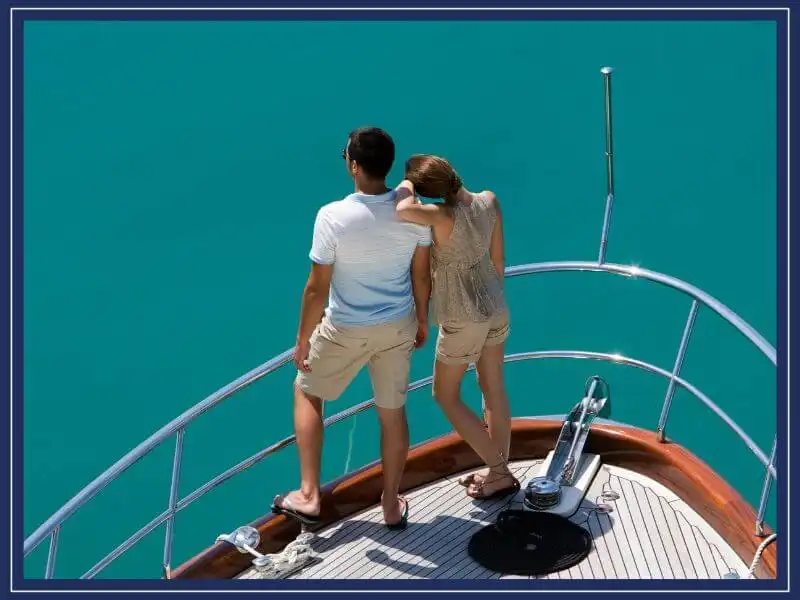
Misconception #3: Guests come for the boat, not the brand
There are still those who, for example, believe that all Lagoon 46s are the same and that guests only look for the “cheapest” or “newest.” The truth is different. Guests choose the experience, safety, flexibility, communication, recommendation. If they don’t know who you are, why you do what you do, and what sets you apart – then yes, all they’ll look at is the price.
A brand in the yacht charter industry doesn’t mean global fame. It means having a clear story and communicating it consistently at every touchpoint – from Google ads to the automated email with pre-arrival info.
Misconception #4: Digital marketing is a campaign, not a process
Many see digital activities as a “one-off” – launch a website, run an ad, post a few times. And then stop. But the guest doesn’t behave in campaigns. They search, observe, compare, and ask questions. And that happens 24/7, 365 days a year. Digital marketing is a process of constant presence, optimization, and adaptation.
Occasional activity will only send the wrong message about you. If, for example, your Instagram profile has its last post for Christmas and New Year, and the next one is for Easter – some random image you found on Google with your logo slapped on it – then you’ve made a series of bad moves and sent the message: “we don’t care, we’re here just to post something because everyone else does, we ‘stole someone’s photo’ because we don’t have our own or don’t want to hire a designer to do it by our brand book, but it’s fine, just come to us, we know our job.”
Misconception #5: We’ll do all that later, when the season’s over
Or worse: “That’s not a priority, the season’s coming, everything will fill up.” Maybe it will. But the question is: at what price? With what kind of guests? At what commission? And with what chance that those guests will return?
Digital strategy isn’t built during peak season, but between seasons – that’s when you have the space to lay the foundation, test content, organize your newsletter lists, and prepare campaigns. Those who plan then, sell the season.
What we can learn from the big platforms
What have the major online boat rental platforms done to become dominant? Some might say: “Of course they dominate – they were first, they invest millions, they have the technology.” But that’s not the whole story. Platforms aren’t successful just because they’re well-designed – they’re successful because they patiently, over years, listened to users, mapped behaviors, and aligned their offer with expectations. They didn’t just copy boat listings from well-known reservation systems – they created tools that help users navigate the sea of offers more easily.
In that sense, platforms have always been more UX (user experience) companies than travel agencies. Their strength lies in data, repetition, optimization. They know which guest clicks what, when they click, and what turns them away the most.
And that’s why the question shouldn’t be: “How do we surpass them?” but: “What can we learn from their persistence?” Because being good at your own job is no longer enough – you also have to be a good communicator of that job.
And while platforms have optimized everything – from guest registration to the review they leave – many yacht charter companies still expect the guest to send an email and “wait for a reply.” In today’s market rhythm, that’s the difference between a booking and a missed opportunity.
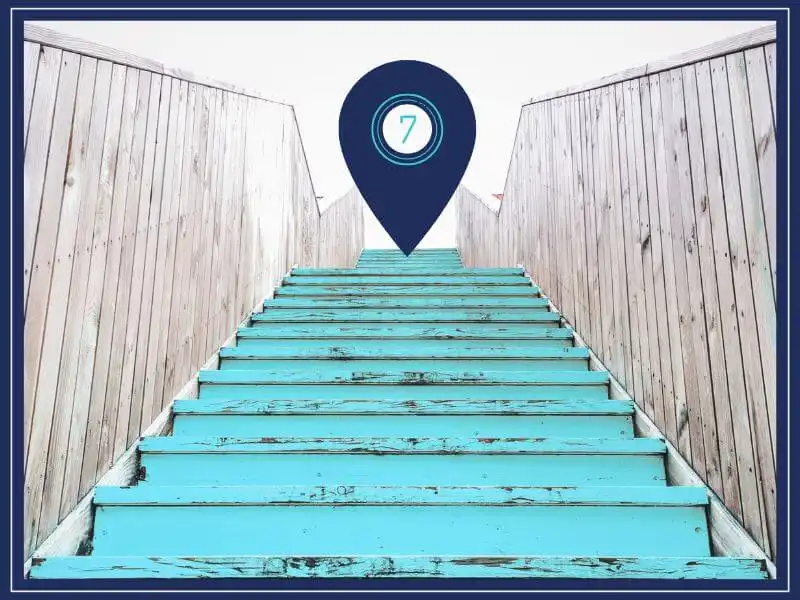
Seven steps small teams can take immediately
And if you think keeping your digital channels up to date is an impossible mission, here’s what you can do today (a checklist for small teams).
- Check the condition of your website. Open it on your phone. Is it fast or do you have to wait for it to load? Is it clear and easy to navigate? Does it have quality photos of the boats and accurate, easily accessible information about them? Are calls to action (CTAs) clearly highlighted?
- Enter accurate information on your Google Business profile. Add working hours, a service description, photos – and regularly monitor reviews. Most importantly, respond to every review, especially the negative ones if there are any.
- Choose one channel for regular communication. It can be Instagram, a newsletter, or a blog – what matters is that you have a rhythm and purpose.
- Write for your guests, not for Google. SEO is important, but authenticity even more so. Use language your guests understand.
- Start keeping track of who your guests are. You don’t need a €5,000 CRM – a basic CRM module is enough to keep guest names, contacts, year of stay, the boat they were on, and a note like “really liked our restaurant recommendation in Kornati.”
- Introduce automated email messages. A thank-you message after booking, a reminder one week before arrival with useful info – give them a preview of what to expect when they arrive at your base, a welcome message. Small things create a big impression.
- Ask yourself one question every week: What can I do this week to get closer to my ideal guest? If you have an answer – you have a strategy.
The role of agents and intermediaries – A partner, not a substitute
In an industry where every booking is a mix of logistics, emotion, and expectations, intermediaries are often the guest’s first point of contact with your fleet. Their role is not redundant. On the contrary – these are often the people who know guests best, who understand their wishes, who can tell when someone is looking for a peaceful route and when they want fun.
But the difference lies in whether the agent will be your partner – or your only window to the market.
Small agencies with a loyal guest base often know their market better than any CRM. But if you don’t have your own channel through which you build relationships in parallel, you’re handing your entire brand over to the agent. That’s neither fair to you nor sustainable in the long run.
On the other hand, large online platforms take the same percentage of commission – and reduce you to a row in an Excel spreadsheet. They don’t build value, they don’t know you, they don’t ask anything. They just sell. And when sales drop – they lower the price.
No one is saying you should end collaborations. But everyone who lives off yacht charter should ask themselves: “What kind of partner do I want to be?” If you’re just a service provider – you’re easy to replace – then we hear things like “there are boats like that elsewhere.” But if you’re a reliable brand, a recognizable voice, and someone guests return to – then you’re not searched for by price, but by name, by reputation.
Intermediaries are necessary, and without them this industry never could, can’t now, and probably won’t be able to in the future. But your future must not depend only on them. In an ideal world, guests choose you because they want you – not because they found you through someone else.
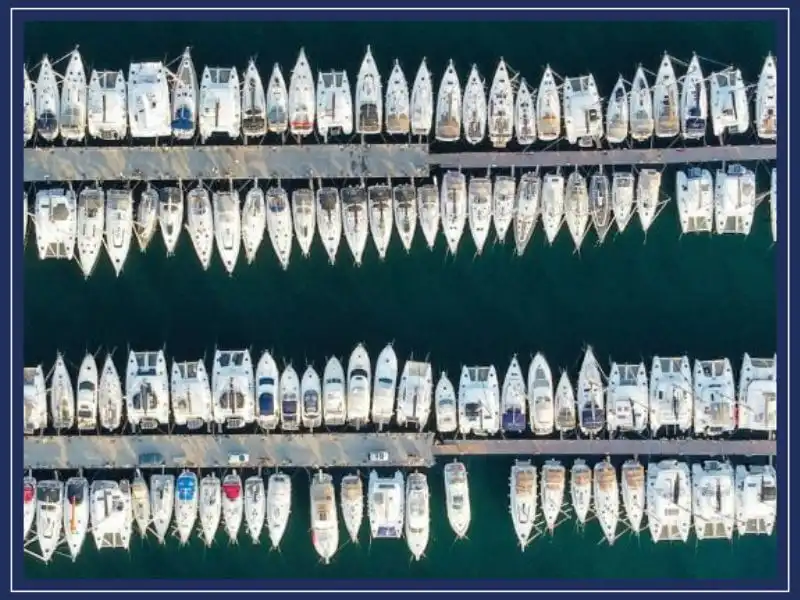
What the story of the first “Borgs” of Croatian yacht charter teaches us
About twenty years ago, a model appeared on the Croatian coast that changed the rules of the game. A company that was among the first to seriously manage fleets through so-called yacht management, gathering private boat owners and offering them stability, bookings, maintenance, and marketing – all in one place, all in one package. They controlled reservations, dominated in numbers, and everything was centrally managed from one Central European country.
They were so powerful that people colloquially called them – Borg. They assimilated everything around them. And for a long time, no one could compete with them. But time did its thing. New players arrived, new technologies, new ways of promotion. Today they are still here, with strong infrastructure and knowledge. But they are no longer the only ones and no longer hold dominance.
What happened? The world changed. We still have our favorite offer of ‘sun and sea’, we have boats – far too many for this precious space – and we have guests. But guest habits, channels, and expectations are no longer the same as they once were. Those who didn’t follow the changes stayed the same. And in a market that is changing, staying the same means starting to decline.
There is no long-term success without relationships
Companies will come and go. Platforms will rise and fall. But what remains – and what always determines who will succeed – is the quality of the relationship with the guest.
Digital marketing is not a trend. It is the way the guest finds you, decides whether they can trust you, and – if you welcomed them well – comes back.
Those who invest in relationships invest in resilience. Those who see themselves in the long run know they cannot afford to be invisible. And that’s why, don’t wait for change – be the change. Because what you build today will be read and remembered tomorrow.
Categories of trends
- News
- Sale
- Marketing
- SEO
- Web design
- Social media
- Technology
- Regulations
- Management
- Education
- Finances
- User experience
Newsletter
Sign up for the newsletter and receive the latest trends and tips straight to your inbox


